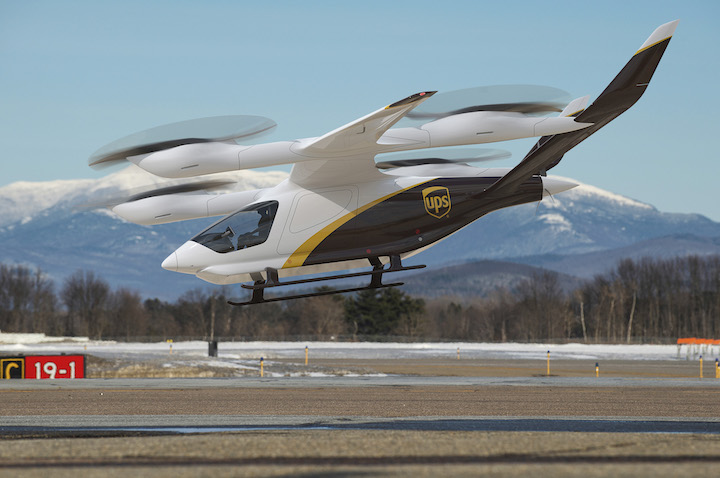United Parcel Service Inc. is buying 10 small electric-powered aircraft that take off like helicopters and fly like planes, aiming to reduce its costs from contracting with small air freighters to reach far-flung areas.
The first delivery of the ALIA-250 from Stone Point Capital-backed Beta Technologies is expected in 2024, UPS said in a statement Wednesday, and the courier has an option to acquire as many as 150. While the vehicles will be piloted, UPS already envisions drone versions that could fly on their own and would be less costly to operate.

Still, there are big hurdles for eVTOLs, even for freight, including a limited range and heavy batteries. The business case for the next-generation technology is in its early stages, spurring caution among analysts such as Richard Aboulafia.
February’s $3.8 billion merger of air-taxi startup Archer Aviation with a blank-check company backed by investment banker Ken Moelis and United Airlines Holdings Inc., is a red flag that the eVTOL market is too frothy, said Aboulafia, an aerospace consultant for Teal Group.
Investment pouring into the industry reminds him of the early 2000s, when startups rushed to develop so-called personal jets. That industry dissolved with the 2008 financial crisis and all the investment turned to dust, Aboulafia said.
“There’s now the same combination of lots of cash looking for a home and a high degree of techno-utopia,” he said.
Cost Estimates
Beta’s aircraft has four rotors on top and a propeller in the back. The company says it can travel 250 nautical miles (290 miles, 460 kilometers) on a charge and can tote as much as 1,400 pounds (635 kilograms) of cargo. That will limit the vehicle’s use since the typical small freighter UPS uses can carry about 3,500 pounds and has a range of roughly 1,200 nautical miles.
While UPS didn’t disclose the price, Beta’s ALIA-250 lists for $4 million each, though large purchases bring a discount, said Kyle Clark, chief executive officer of the South Burlington, Vermont-based manufacturer.
Clark, a plane and helicopter pilot, estimated that the operating cost of an eVTOL is about half that of a small cargo plane, mostly because of fuel and maintenance savings.
It costs about $380,000 to overhaul a Cessna 208 engine, which is needed after about 3,000 flight hours. Overhauling the ALIA-250’s electric motors is expected to cost a third less and wouldn’t be necessary until 10,000 hours, he said in an interview.
Skirting Traffic
UPS could also save by reducing the need for trucks and—at some point—pilots.
Juan Perez, chief information and engineering officer at the Atlanta-based courier, said the aircraft will be nimble enough to land at a sorting center’s parking lot, allowing the courier to avoid using small air-freight contractors and trucks to get packages from its main hubs to facilities in remote areas, such as North Dakota.
“It will allow us to bypass a lot of the handoffs that take place today with using the typical small airplanes,” Perez said in an interview.
UPS expects to use the eVTOL in more populated areas as the aircraft’s safety is established. Perez envisions flying packages in bulk, for example, to downtown Atlanta from the city’s airport, skirting metropolitan area traffic.
If the aircraft can be operated as a drone, it promises to be even more cost-effective. Autonomous flights would be on routes currently served by contractors, so they wouldn’t affect UPS’s union pilots, who fly large cargo jets, Perez said.









